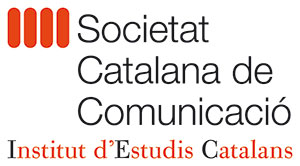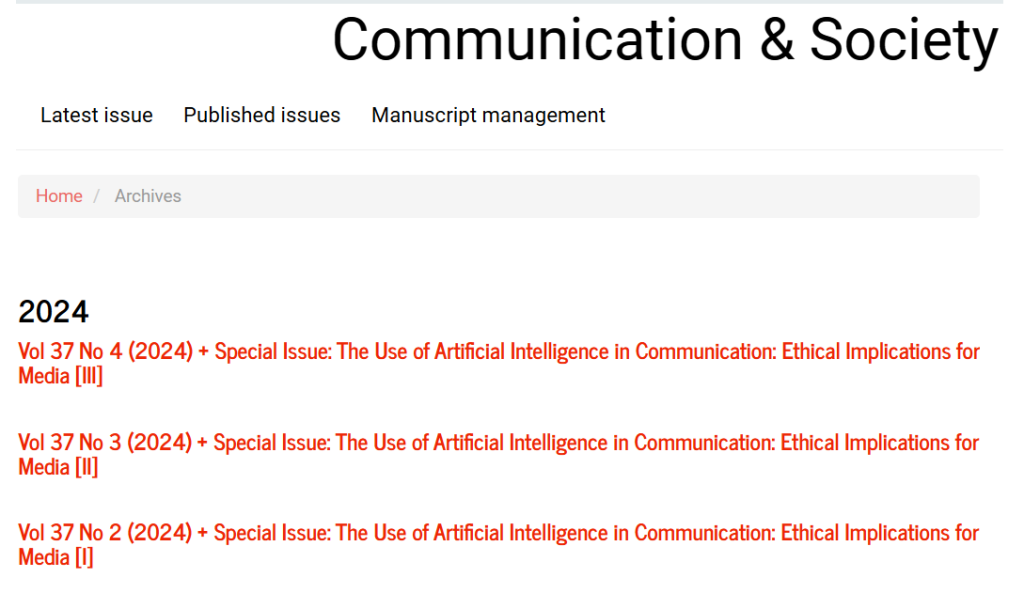La revista Communication & Society que publica tots els seus articles en obert ha completat amb el número del mes d’octubre, el tercer lliurament de l’any 2024 dedicada a la inteligència artificial i la comunicació amb un enfoc preferent cap a l’ètica, pero cobrint a la vegada altres temes, des del big data fins el cinema passant per la televisió, el periodisme i la publicitat entre altres.
Communication & Society és una revista diamant (open access sense APC) i els seus tres últims números del 2024 han estat dedicats a la intel·ligència artificial, amb un mateix equip d’editors: Sandra Borden (WMU), Maria-José Ufarte-Ruíz (UCLM) i Lluís Codina (UPF). Les recerques publicades han estat les següents (un cop en la pàgina de cada número, cal fer scroll per a veure les contribucions dels monogràfics):
- Adoption and use factors of artificial intelligence and big data by citizens
Patricia Sánchez-Holgado, Carlos Arcila-Calderón - Criteria for journalistic quality in the use of artificial intelligence
Luis-Mauricio Calvo-Rubio, José-Luis Rojas-Torrijos - Impact of Artificial Intelligence on RTVE: Verification of fake videos and Deep fakes, content generation, and new professional profiles
Marta Sánchez-Esparza, Santa Palella-Stracuzzi, Ángel Fernández-Fernández - Covering artificial intelligence: the role of European Union, British, and American media outlets in generative AI Visibility
Rubén Alcaraz-Martínez, Mari Vállez, Carlos Lopezosa
- Automation and creativity in AI-driven film editing: the view from the professional documentary sector
Jorge Caballero, Carles Sora-Domenjó - Seeking to define deepfakes from U.S. state laws
João-Paulo Meneses - The Ethical Revolution: Challenges and Reflections in the Face of the Integration of Artificial Intelligence in Digital Journalism
Tania Forja-Pena, Berta García-Orosa, Xosé López-García - Generative AI changes the book publishing industry: reengineering of business processes
Olena Ryzhko, Tetiana Krainikova, Svitlana Vodolazka, Kateryna Sokolova - «You are an AI and you know a lot more than humans»: A Semiotic Discourse Analysis of the World’s First AI TV Show
Rizwan-Bashir Baloch, Abul Hassan, Ali-Ab-Ul Hassan
- The challenges of media and information literacy in the artificial intelligence ecology: deepfakes and misinformation
Alberto Sanchez-Acedo, Alejandro Carbonell-Alcocer, Manuel Gertrudix, Jose-Luis Rubio-Tamayo - Possibilities and challenges of Artificial Intelligence in the teaching and learning process of Journalism Writing. The experience in Spanish universities
M.-Ángeles Fernández-Barrero, Isaac López-Redondo, Luisa-Graciela Aramburú-Moncada - Transparency in AI usage within fact-checking platforms in Spain and its ethical challenges
Roger Cuartielles, Marcel Mauri-Ríos, Ruth Rodríguez-Martínez - AI-Driven Advertising Activity: Perspectives from Peruvian Advertisers
Francisco Arbaiza, Jazmine Arias, Kelly Robledo-Dioses - Start making sense. Sociosemiotic contributions to the understanding of Generative Artificial Intelligences
Carlos-A. Scolari - Using generative Artificial Intelligence tools in Public Relations: Ethical concerns and the impact on the profession in the Romanian context
Camelia Cusnir, Anamaria Nicola
Per la seva part, les editorials de cadascun dels tres número es poden trobar aquí:
- Fanning the flames of artificial intelligence in the media: beyond efficiency and productivity gains
Lluís Codina, María-José Ufarte-Ruiz, Sandra-L. Borden - The revolution driven by artificial intelligence continues: a journey through the media landscape
María-José Ufarte-Ruiz, Sandra-L. Borden, Lluís Codina - Our relationships with GenAI and the media: Testing the limits of transparency, trust and moral agency
Sandra-L. Borden, Lluís Codina, María-José Ufarte-Ruiz

